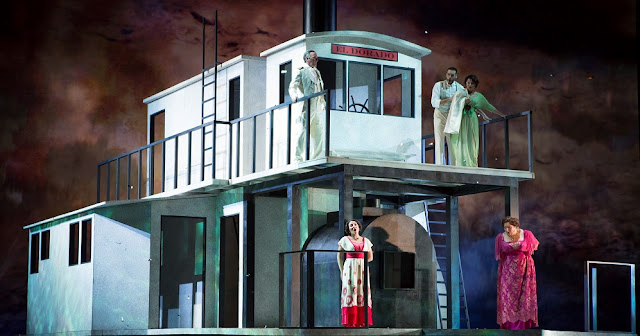Here is your regular Sunday selection of links to online audio and online video from the week gone by. After clicking to an audio or video stream, press the "Play" button to start the broadcast. Some of these streams become unavailable after a few days.
- Listen to a concert from the Regensburg Early Music Festival, recorded last June, with Hervé Niquet conducting Le Concert Spirituel in music of Purcell. [RTBF]
- Olivier Baumont, Frédéric Desenclos, and Martin Gester perform organ music by French composers of the 17th and 18th centuries, recorded in the church of Saint-Michel en Thiérache as part of the Festival de Musique Ancienne et Baroque de Saint-Michel en Thiérache, on the historic organ made by Jean Boizard in 1714. [France Musique]
- From the Théâtre des Champs-Élysées, a performance of Berlioz's Roméo et Juliette starring mezzo-soprano Marianne Crebassa, tenor Paolo Fanale, and bass Alex Esposito with the Orchestre National de France under Daniele Gatti. [France Musique]
- Listen to a performance of Tchaikovsky's The Enchantress from the Theater an der Wien. [ORF]
- The Missa Scala Aretina, psalms, motets, and villancicos by Catalan composer Francesc Valls performed by La Grande Chapelle under Albert Recasens from the Festival de Musique Ancienne et Baroque de Saint-Michel en Thiérache. [France Musique]
- Collegium Vocale 1704, under Václav Luks, performs sacred music by Fux, Tuma, and Zelenka, recorded last month at the Utrecht Early Music Festival. [ORF]
- Marc-André Hamelin plays a recital featuring his own music, plus that of Medtner and Schubert. [RTBF]
- From the Festival d'Ambronay, La Cappella Mediterranea under Leonardo Garcia Alarcon perform music by Domenico Scarlatti, Sigismondo d'India, and Carlo Gesualdo. [France Musique]
- Watch Myung-Whun Chung conduct the season opener of the Orchestre Philharmonique de Radio France, joined by soloist Evgeny Kissin. [Cité de la Musique Live]
- A concert by the Vienna Piano Trio, with music by Mendelssohn and Beethoven. [RTBF]
- Concerts by the Royal Stockholm Philharmonic Orchestra, playing symphonies by Beethoven and Wilhelm Stenhammer under Herbert Blomstedt, and the Helsingborg Symphony Orchestra, with Andrew Manze conducting Lars-Erik Larsson's four sketches on Shakespeare's A Winter's Tale. [ORF]
- The last night of the Proms, preceded by the August 18 recital of songs performed by soprano Anne Schwanewilms and pianist Malcolm Martineau from Cadogan Hall. [France Musique]
- Listen to the Akademie für alte Musik Berlin and soprano Isa Katharina Gericke perform music by C.P.E. Bach. [RTBF]
- From the Schubertiade Schwarzenberg, a recital of songs by Schubert and Strauss performed by soprano Adrianne Pieczonka and pianist Brian Zeger. [ORF]
- Watch Tugan Sokhiev and the Orchestre National du Capitole de Toulouse perform Dvořák's ninth symphony, plus Tchaikovsky's first piano concerto with Behzod Abduraimov as soloist. [Medici.tv]
- Violinist Frank-Peter Zimmermann joins the Cleveland Orchestra for Shostakovich's first violin concerto, plus Dvořák's sixth symphony conducted by Franz Welser-Möst. [RTBF]
- From the Internationale Haydntage, the Acies Quartett performs music by Mozart, Haydn, and Schubert. [ORF]
- Ton Koopman leads the Cleveland Orchestra in music by Mozart, Fischer, Rebel, and Haydn. [RTBF]
- Juanjo Mena leads the BBC Philharmonic Orchestra and pianist Stephen Hough in music by Mendelssohn, Schumann, and Mahler. [France Musique]
- Listen to the Royal Northern Sinfonia perform music of Beethoven and Brahms at Sage Gateshead. [BBC3]
- Watch the Orchestre Philharmonique du Luxembourg under conductor Emmanuel Krivine in music of Stravinsky, Ravel, and Dvořák, with pianist Jean-Efflam Bavouzet as soloist. [Arte]
- Violinist Andrey Baranov joins the Orchestre national de Belgique, under conductor Andrey Boreyko, for Bruch's first violin concerto, plus a performance of Bruno Mantovani's symphonic poem Schlemihil. [RTBF]
- Emanuel Ax plays the Brahms first piano concert with the Rotterdam Philharmonic Orchestra, under Yannick Nézet-Séguin, recorded last month at the Grafenegg Festival. [ORF]
- The ensemble C Barré performs a program of four world premieres inspired by mechanical sound, composed by Alexandros Markeas, Jean-Christophe Marti, and Frédéric Pattar, recorded at the Festival de Chaillol. [France Musique]
- Matthias Jung conducts the Batzdorfer Hofkapelle and the Sächsisches Vocalensemble in Homilius's Der Messias, recorded last June at the Dresden Musik Festival. [ORF]
- A recital by pianist Michel Dalberto with music by Bach, Liszt, and Ravel, recorded at the Festival de musique sacrée de La Chaise-Dieu. [France Musique]
- From the Schubertiade Schwarzenberg, a performance of Schubert's song cycle Die schöne Müllerin by tenor Benjamin Bruns and pianist Gerold Huber, recorded last month. [ORF]
- Leonard Slatkin leads the Orchestre National de Lyon in its season opener, in music of Berlioz, Chabrier, Canteloube, and soprano Sylvia McNair in songs of Gershwin. [France Musique]
- Pianist Javier Perianes and the Orchestre Symphonique de la Principauté des Asturies, under conductor Rossen Milanov, perform music by Marcos Fernandez, Manuel de Falla, Shostakovich, and Gerynimo Giminez. [France Musique]
- Listen to the fine recording of Rameau's Hippolyte et Aricie starring Véronique Gens (Aricie), Jean-Paul Fouchécourt (Hippolyte), and Bernarda Fink (Phèdre), with Les Musiciens du Louvre-Grenoble and Marc Minkowski. [ORF]
























